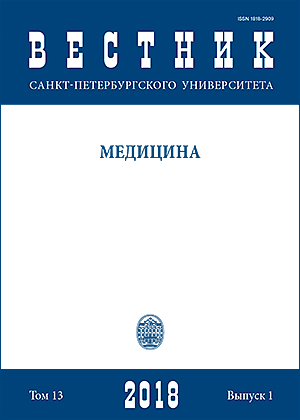Vegetables and fruits in the prevention and treatment of cancer in the light of evidence-based medicine (part 2)
DOI:
https://doi.org/10.21638/11701/spbu11.2018.109Abstract
A survey of existing literature has analyzed the effect of vegetables and fruits on the risk of developing cancer of the prostate, lungs, pancreas, oral cavity, pharynx and larynx, esophagus and stomach, liver and gallbladder, kidneys and urinary bladder and justifies the possibility of their use for the prevention of these diseases and to improve the quality of life of patients with cancer. It has been established that in order to reduce the risk of cancer, it is not so much the use of certain groups of fruits and vegetables that have the most pronounced preventive effect on certain types of cancer, but rather the overall anti-cancer focus of the entire diet, as well as their sufficient intake. Recommended levels of consumption of vegetables vary according to different authors from 240 to 402 grams per day, fruits — from 160 to 460 grams per day, dietary fiber — from 25 grams per day. The drawback of existing norms of consumption is the lack of norms for certain groups of fruits, berries and vegetables. Given the various causes and different mechanisms of the development of individual forms and localizations of malignant tumors, a maximally differentiated approach is needed in the evaluation of both individual products, individual cancer localizations and their varieties within each localization, including the histological type of tumors and also genetic differences. In addition, it is important to conduct research with qualitative design on large contingents, with the exception of systematic and accidental errors, and also taking into account, in the first place, clinically relevant outcomes (mortality and life expectancy of healthy persons, quality of life, metastasis rate, angiogenesis and tumor proliferation in patients etc.), and not only favorable dynamics of laboratory indicators.
Keywords:
vegetables, fruits, berries, prevention and treatment of cancer, evidence-based medicine
Downloads
References
References
Downloads
Published
How to Cite
Issue
Section
License
Articles of "Vestnik of Saint Petersburg University. Medicine" are open access distributed under the terms of the License Agreement with Saint Petersburg State University, which permits to the authors unrestricted distribution and self-archiving free of charge.




